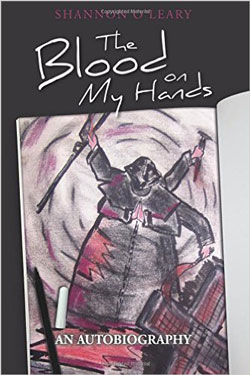 Unfortunately, The Blood on my Hands is a true story.
Unfortunately, The Blood on my Hands is a true story.
I spent my childhood in Australia in the 1960s and 70s, and it was not what one would call conventional. While, in most cases, a family is a group of people you can trust and feel comfortable with, mine left me to the will of my father—a serial killer capable of the most horrific and trauma-inducing acts one could possibly imagine. Really, though, I don’t think the average person would be able to imagine what I lived through.
When I wrote The Blood on My Hands, I decided to write it from the perspective of my childhood self. When I finally decided it was time to tell my story, it was for the sake of closure for me and—hopefully—the families of my father’s victims. I sincerely hope that in sharing my experiences, some light may be shed on the whereabouts and stories of the other victims.
The laws in the 1960s and 70s did little to protect those in an abusive situation. Many child abuse cases were swept under the rug, as there were not laws in place to protect children. Domestic violence was prevalent, and wives were expected to do what they were told by their husbands. The Catholic Church frowned upon divorce, and people were scared of social repercussions.
Why do some crimes go unsolved? Why do some serial killers get away with it?
The absence of a body makes it hard to get a conviction.
In my case, my father was very clever, and did his utmost to remain undetected while he continued his brutal activities. Despite his madness, he was methodical and tactical, and he had a number of strategies to ensure he remained unobserved. His property was surrounded by a national park and rugged Australian bush terrain. On his property, which was on the outskirts of Sydney, he set up four industrial meat mincers in dense bushland. The remnants left after he had used these mincers was scattered in the bush for wildlife to take care of. He also had large quantities of lime on the property, and a body or animal buried in this substance disintegrates with time.
My father’s victims were chosen very specifically. He made sure there was a very low likelihood that anyone would come looking for them. Many of these people were teenage runaways, the homeless, and women who were escaping from abusive relationships and needed friendship and a safe house for their children. These people could disappear without anyone realizing they were missing. In fact, when my mother took my siblings and me to try and escape, we lived under a pseudonym, and no one ever bothered to question it or ask for proof of our identity.
In the days before social media and the internet, my father merely needed a plausible alibi to explain his occasional disappearances when family emergencies took place. The abuse that my family and I endured was a daily occurrence, and we put up with it. We didn’t have any idea what a normal family or life was, so how could we compare ours to something better? We lived in constant terror of reprisals of past horrors, and when we tried to disclose what was happening at our property, we were ignored by everyone who could have helped us.
It is doubtful that the identities of the victims will ever be solved when our repeated cries for help were never answered; and as the years have marched on, the more likely it’s become that those injured by my father will remain lost in time.
You must remember that the Australian bush is a vast and rough terrain that is mainly explored by established bush tracks. Venturing into the uncharted terrain is often fraught with difficulties—venomous snakes, cliffs, and an endless sea of trees, which can easily disorient those who do not know the area. It is relatively easy to dump a body in these vast wilderness areas, as walkers do not go off the tracks.
The police investigation remained open until my father died, but without a body, there could be no conviction. My father had committed perfect crimes, and this is why serial killers exist. They prey on the hope that they will never be caught and be brought to justice.
The themes of the book are gruesome and unnerving, and my father’s psychosis is both compelling and disturbing to read. The story that The Blood on my Hands relates is both horrific and chilling, but my family survived and eventually escaped our predator.
I still feel haunted and traumatized by the past, but I am determined not to let it ruin the rest of my life. I still have nightmares and anxiety, but I keep myself busy doing work that I love.
My single greatest hope in sharing my story is that it will help someone else one day—that they will know it is possible to survive, and even thrive in life, once they gather the courage to walk away from their abuser.
To learn more or order a copy, visit:
Shannon O’Leary is a prolific writer and performer. She is the author of several books of poetry and children’s stories, and she has won many awards for song-writing. Shannon has acted and directed on the stage and on Australian national TV, and she runs her own production company.
She has numerous graduate and post-graduate degrees in education, music, and science. She is a teacher and academic, has five children with her deceased former husband, and lives with her longtime partner in Sydney, Australia.
Readers can connect with Shannon on Facebook, Twitter, Goodreads.
